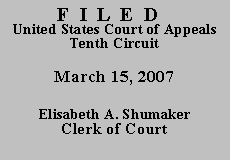

| UNITED STATES OF AMERICA, |
|
| v. | |
| SHAWN C. SHIELDS, also known as Shorty, |
On May 18, 2005, Jessie Cluff, a Colorado inmate, testified as a government witness in the federal prosecution of two fellow Colorado inmates, Carl Pursley and Wendell Wardell, for conspiring to file fraudulent tax returns while in prison. Mr. Shields and another Colorado inmate, Vernon Templeman, were called as defense witnesses, although they apparently knew nothing about the claimed offenses. On May 23 all five inmates were in holding cells at the federal district court in Denver. Mr. Shields was in the same cell as Cluff and Templeman. Pursley and Wardell were in a nearby cell. A video surveillance camera recorded Mr. Shields and Templeman attacking Cluff.
At Mr. Shields's trial in this case, Cluff testified that while in the cell with Mr. Shields before the assault, he heard shouted conversation between Pursley and Mr. Shields. According to Cluff, Mr. Shields thanked Pursley for getting him transferred temporarily from state prison to the custody of the U.S. Marshals, Pursley responded that "there was a reason why [Mr. Shields] was down there," and Mr. Shields replied that "it would be easier than he thought." In addition, Cluff said that he saw Mr. Shields and Templeman whispering to one another; that Templeman also engaged in shouted conversation with Pursley; and that Pursley yelled that Harry Hall, a fourth prisoner in the cell with Mr. Shields, Templeman, and Cluff, "was all right, he was cool." Cluff testified that Mr. Shields then "told me that my worst nightmare had come true," "[t]hat he was friends with Carl Pursley," and that "the whole purpose of his trip was to get me."
Another witness was a prisoner who had been in the same holding cell as Wardell and Pursley. He testified that he had heard conversations between the holding cells and that he also heard either Wardell or Pursley refer to Cluff and say that Mr. Shields "will take care of him."
The testimony that Mr. Shields challenges came from Deputy U.S. Marshal Lawrence Moltzan. Moltzan tended to Cluff after the assault and transported him to the hospital. Moltzan testified that Cluff told him (1) that before the assault Mr. Shields shouted to Pursley, "Hey, Cluff is down here with us," and (2) that Pursley responded, "Well, you know what to do." Because these statements were offered for the truth of what Cluff had asserted, they were hearsay.
The district court admitted Deputy Moltzan's challenged statement as an "excited utterance" under Fed. R. Evid. 803(2). We will assume, without deciding, that the exception was not applicable and admission of the statement was error. Because Mr. Shields objected to the court's ruling, "we review for nonconstitutional harmless error." United States v. Ledford, 443 F.3d 702, 707 (10th Cir. 2005). Nonconstitutional error is harmless "unless it had a 'substantial influence' on the outcome or leaves one in 'grave doubt' as to whether it had such effect." United States v. Rivera, 900 F.2d 1462, 1469 (10th Cir. 1990) (en banc) (quoting Kotteakos v. United States, 328 U.S. 750, (1946)). In our view, admission of Moltzan's statement was harmless under this standard. The evidence of a conspiracy was overwhelming. Not only had Mr. Shields unquestionably conspired with cellmate Templeman, but the assault could be explained only by the arrangement these two had with Pursley.
Because Mr. Shields made no Confrontation Clause argument below, we review for plain error his Confrontation Clause argument on appeal. See United States v. LaHue, 261 F.3d 993, 1009 (10th Cir. 2001). To establish plain error, Mr. Shields must show "(1) error, (2) that is plain, which (3) affects substantial rights, and which (4) seriously affects the fairness, integrity, or public reputation of judicial proceedings." United States v. Gonzalez-Huerta, 403 F.3d 727, 732 (10th Cir. 2005) (en banc) (internal quotation marks omitted). Because of the overwhelming evidence of guilt, the third prong of this test cannot be satisfied, so we need not consider whether there was any error. Cf. United States v. Lott, 310 F.3d 1231, 1242 (10th Cir. 2002).
We AFFIRM the judgment of the district court.
ENTERED FOR THE COURT
Harris L Hartz
Circuit Judge
*.This order and judgment is not binding precedent except under the doctrines of law of the case, res judicata, and collateral estoppel. It may be cited, however, for its persuasive value consistent with Fed. R. App. P. 32.1 and 10th Cir. R. 32.1.